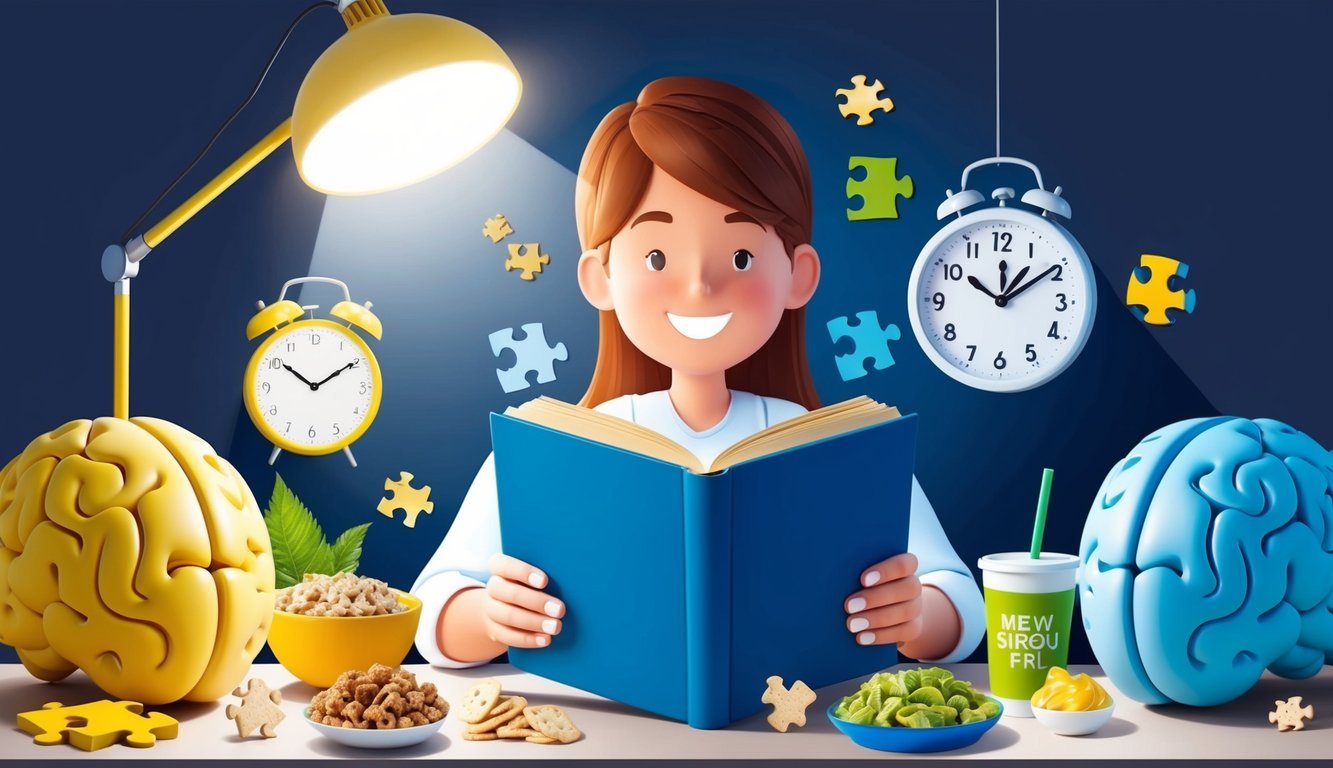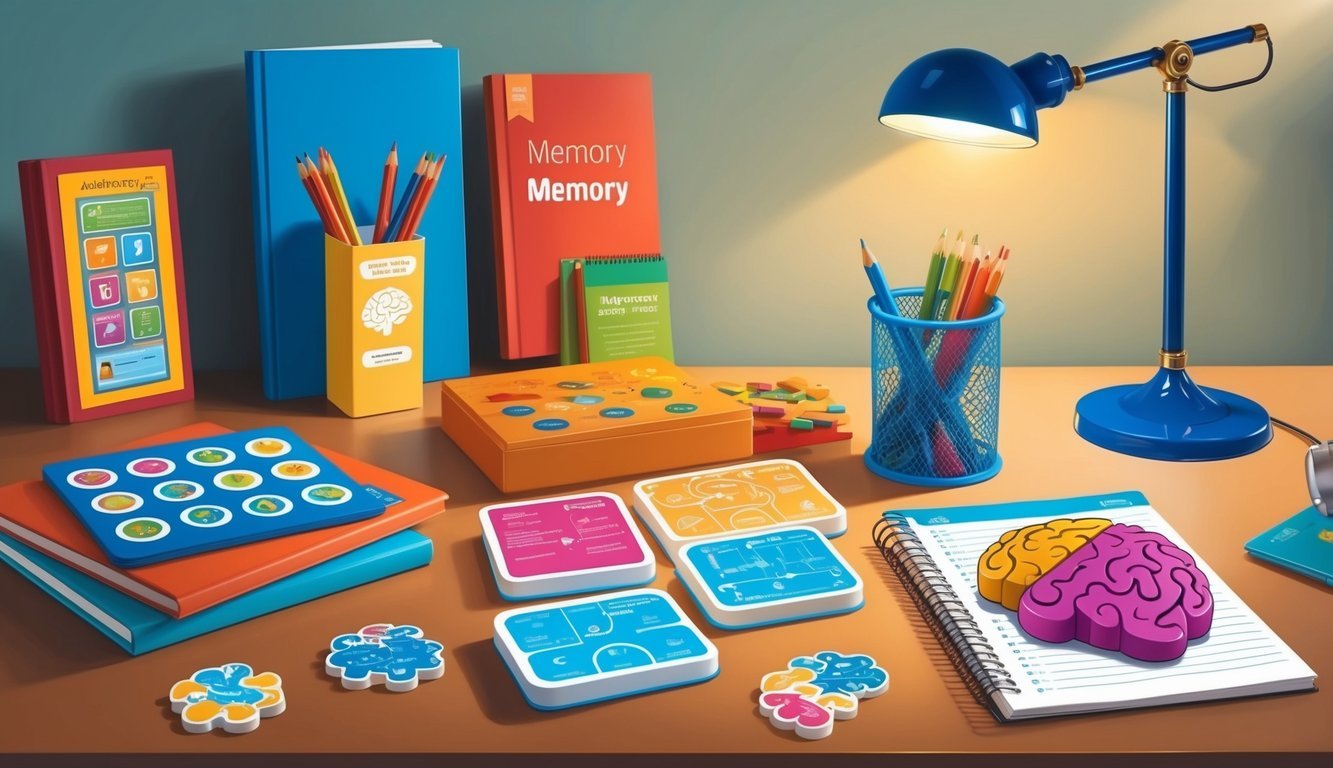Staying mentally sharp is crucial for maintaining overall brain health as we age.
I’ve found that integrating simple habits into my daily routine can significantly enhance cognitive function and keep my mind agile. Whether it’s picking up a new skill, engaging in social activities, or prioritizing restful sleep, these practices can make a real difference in my mental clarity.

I often think about how the little things add up over time.
From the foods I eat to the way I manage stress, every detail contributes to my brain’s vitality.
Each tip for keeping my mind sharp not only helps me today but also sets me up for a healthier cognitive future.
1) Solve puzzles daily
I make it a habit to solve puzzles every day.
It’s a fun way to keep my brain actively engaged.
Whether it’s crosswords, Sudoku, or logic puzzles, I feel it challenges my thinking.
Puzzles can boost memory and improve problem-solving skills.
When I focus on these tasks, I notice an increase in my mental sharpness.
Plus, they’re often enjoyable and help me unwind.
I try to switch up the types of puzzles I do.
This variety keeps things interesting and encourages different ways of thinking.
There are plenty of apps and books available, making it easy to find new puzzles to tackle.
Some days, I might spend just a few minutes on a quick puzzle.
Other days, I dive into something more complex.
No matter what I choose, the daily practice of solving puzzles is a great way to support my brain health.
2) Learn a new language
Learning a new language is one of the most enjoyable ways to stay mentally sharp.
It challenges my brain in unique ways and creates new neural connections.
The complexity of mastering vocabulary and grammar keeps my mind active.
As I practice, I notice improvements in my memory and attention.
It feels rewarding to switch between languages and express myself differently.
This creativity often spills into other areas of my life, enhancing my problem-solving skills.
Regular language practice is key.
I’ve found that dedicating just a little time each day really helps.
Whether through apps, books, or classes, consistency makes a big difference.
Moreover, the experience of interacting with others in a new language is invigorating.
It opens up cultural perspectives and connects me with people in meaningful ways.
3) Practice meditation
Meditation has been a game changer for me when it comes to staying mentally sharp.
It helps me clear my mind and focus on the present moment.
I’ve noticed that even a few minutes of meditation each day can significantly boost mental clarity and focus.
It allows me to manage stress more effectively and approach challenges with a calm, collected mindset.
By making meditation a daily habit, I feel more productive and in control of my thoughts.
When I meditate, I usually find a comfortable spot and sit with my back straight.
I breathe in through my nose, letting my lungs fill up.
Then, I exhale slowly through my mouth, paying attention to how my body feels.
There are various techniques out there, and I often mix them up.
Sometimes I focus on my breath; other times, I simply let my thoughts come and go without judgment.
If I get distracted, I gently bring my focus back to my breathing.
I’ve noticed that after a short meditation session, my mind feels clearer and more relaxed.
Research suggests that regular meditation can improve self-compassion and even reduce feelings of depression.
It’s a simple practice that can bring some calm into my day and keep my brain in good shape.
Plus, it only takes a few minutes, making it easy to fit into my routine.
4) Engage in social activities

I’ve found that engaging in social activities really boosts my mental sharpness.
Making strong social connections is important for maintaining brain health.
When I spend time with friends or family, I’m not just enjoying their company.
I’m also stimulating my brain.
Conversations can challenge my thinking and improve my memory.
I try to participate in group activities, whether it’s playing games, joining clubs, or just chatting over coffee.
These interactions keep my mind active and engaged.
The laughter and discussions help strengthen my neural connections.
Plus, being socially active can lead to new learning experiences, which I enjoy.
I’ve noticed that the more I connect with others, the better I feel mentally.
It’s a great way to keep my mind sharp while also having fun.
5) Read a Challenging Book

I find that picking up a challenging book is a fantastic way to keep my mind engaged.
It requires focus and critical thinking, which are essential for mental sharpness.
When I choose a book that pushes my limits, I end up processing complex ideas and expanding my vocabulary.
This not only keeps me entertained but also stimulates my brain.
Reading different genres or subjects can add variety to my routine.
Fiction can improve empathy, while non-fiction can sharpen analytical skills.
I like to mark passages or take notes on points that intrigue me.
This interaction enhances my comprehension and retention, turning a simple reading session into a more enriching experience.
Diving into challenging literature also sparks creativity.
It encourages me to think outside the box and consider new perspectives.
Lastly, incorporating reading into my daily routine, even just for a short period, helps me create a healthy habit that benefits my brain in the long run.
6) Play memory games

Playing memory games is a fun way to keep my brain active.
These games challenge my recall and require me to think quickly, which can be stimulating and enjoyable.
I love using apps designed for mental workouts, like Peak, which offers short exercises to boost my memory and focus.
Competing against friends adds a little extra motivation.
Traditional games like cards or board games can also work wonders.
They often require me to remember rules or keep track of various elements.
Puzzles, like jigsaw puzzles, engage my brain too.
They improve my visuospatial skills and require concentration, making them perfect for some downtime.
Learning a new language through apps like Duolingo not only helps my memory but strengthens my overall cognitive abilities.
Making it a routine has really kept my mind sharp.
Incorporating memory games into my daily activities can make a big difference in brain health.
It’s all about keeping things engaging and fun!
Understanding Brain Health

Maintaining brain health is essential for cognitive function and overall well-being.
Two crucial aspects of this topic are brain plasticity and the importance of mental stimulation.
Brain Plasticity Explained
Brain plasticity, or neuroplasticity, is the ability of the brain to adapt and change throughout life.
This means that our experiences, learning, and environment can physically alter the structure and function of our brains.
For instance, when I learn a new skill or take up a new hobby, my brain forms new connections between neurons.
This adaptation can enhance my memory and problem-solving abilities.
Here are some key points about brain plasticity:
- Learning and Memory: New experiences stimulate brain changes, improving memory retention.
- Recovery from Injury: Neuroplasticity can help recover lost functions after brain injuries.
- Lifelong Development: Engaging in challenging activities keeps the brain flexible, benefiting all ages.
Importance of Mental Stimulation
Mental stimulation is like a workout for my brain.
Keeping mentally engaged helps maintain cognitive function and can reduce the risk of decline as I age.
Activities like puzzles, reading, and learning new skills can challenge the mind and foster growth.
Research shows that people who stay mentally active are less likely to develop conditions like dementia.
To incorporate mental stimulation into my routine, I can:
- Solve Puzzles: Crosswords or Sudoku offer fun, challenging brain workouts.
- Read Regularly: Books and articles expose me to new information and ideas.
- Learn New Skills: Taking up a new hobby keeps my brain engaged and active.
Lifestyle Factors Affecting Mental Sharpness

Maintaining mental sharpness involves a blend of lifestyle choices that can significantly impact brain health.
Key areas to consider are physical exercise and nutrition, which have been shown to support cognitive function as we age.
The Role of Physical Exercise
Staying active is one of the best things I can do for my brain.
Regular physical exercise improves blood flow to the brain, which is essential for its health.
Activities like brisk walking, cycling, or even dancing help stimulate the release of growth factors that encourage brain cell development and survival.
Benefits of Exercise:
- Enhances memory and cognitive functions
- Reduces stress and anxiety levels
- Improves sleep quality, which is crucial for mental health
I try to aim for at least 150 minutes of moderate aerobic activity each week.
Incorporating strength training twice a week can also boost cognitive function and improve my overall well-being.
Consistency is key, so finding activities I enjoy makes it easier to stick with it.
Impact of Nutrition on the Brain
What I eat plays a huge role in how my brain functions.
A balanced diet rich in fruits, vegetables, whole grains, and healthy fats provides essential nutrients for cognitive health.
Omega-3 fatty acids found in fish, nuts, and seeds are particularly beneficial for brain function.
Brain-Boosting Foods:
- Blueberries: High in antioxidants that may delay brain aging
- Leafy Greens: Packed with vitamins and minerals
- Walnuts: A great source of healthy fats and protein
I also watch my sugar and processed food intake.
These can negatively impact memory and cognitive abilities.
Staying hydrated is important as well.
Even mild dehydration can impair focus and memory.

